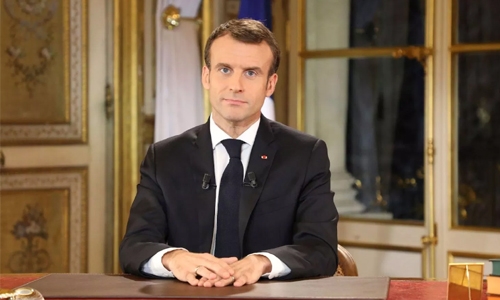crackdown now also extends beMacron’s moment of truth
He was the saviour of Europe. A 39-year-old maverick who rescued France from the populist tide, the newcomer who crushed his far-right opponent Marine Le Pen in a TV debate on the eve of a presidential election. The leader who would make liberal democracy great again. The visionary who had a plan to jump start the European Union. A 21st-century John Kennedy. Some joked that he could walk on water. That was 2017. Eighteen months into his presidential term, Emmanuel Macron, faced with an uprising by a leaderless army of working poor in yellow vests and by violence unseen since the student riots of May 1968, is struggling to take back control of his country.
The charismatic young president was jeered by protesters who tried to chase his car this week when he visited a public building set afire by rioters in Le Puy-en-Velay, in south-central France. “Macron, démission” — “Macron, resign” — has become the rallying cry of these modern-day sans-culottes, whose anger is directed at him, personally. In a rare show of humility, Macron admitted a month ago that he had “failed to reconcile the people with its leaders.” Little did he suspect that the anger would turn into hatred, of the kind thrown in the face of dictators by the Arab Spring.
As a fourth Saturday of protests looms, in spite of an olive branch offered by the government, nobody can predict whether this revolt will eventually give way to dialogue or degenerate into an even more profound and dangerous crisis. What went wrong? Two sets of factors have come into play. One is not specific to France: an insurrectional wave that is now a familiar feature of Western democracies shaken by the disruptions of globalisation, the aftermath of the 2008 economic crisis and the inability of our traditional political parties to adjust to these new challenges.
Brexit, Donald Trump’s election, an emergence of the far right in Germany and a victory of anti-system parties in Italy — all, though less violent, are part of the same dynamics. Emmanuel Macron was initially seen as a bulwark against this trend. More determined than his predecessors, he would reform France with a progressive agenda that would do away with the injustices of the old world.
This is where the second set of factors comes in, and it is of the president’s own making. As the historian Gérard Noiriel has noted, in Macron’s book “Révolution,” which introduced his presidential bid, there was no mention of the working class. His revolution was not of the masses — it was meant to be top down, and for a while it worked. In his first year in office, the young president adroitly passed several reforms, including of a labor law, and survived a painful strike of railway workers without sacrificing a reform of the national railway company.
By then, Macron may have been thinking that he could, indeed, walk on water. Unfortunately, nobody can — not even him. His vertical way of exercising power — some call it Jupiterian, others monarchical — became more and more of a problem: his being surrounded by a small team of technocrats; the contempt he seemed to hold for people not lucky enough to be as successful as he was; his lack of knowledge of the local political terrain because he had never been elected before. The combination left people feeling that their president was out of touch.
His tax policy made him “the president of the wealthy.” He ignored his falling approval rates; he had set his course. When Fareed Zakaria of CNN asked him on Nov 10 whether he would have to slow down his reforms, he defiantly answered, “I have been elected for five years and I have no midterms.” The Yellow Vests have become Macron’s midterms, only more brutal. He has been so busy that he forgot to create a new political force to support his agenda. That has left him vulnerable, because his party’s Parliament members, elected a few weeks after him, are as inexperienced in politics as he is. So what if Macron fails? This is not an easy question.
In the uncharted environment created by the collapse of the old French political balances, there is no obvious alternative, no opposition leader prepared to win a snap election, no strong political parties. Whatever happens in the next few days, Macron will not be able to govern as he did in his first year. “One cannot govern against the people,” his political ally François Bayrou sternly warned him last week. Most likely, his reform agenda will need a pause. The hard work still to be done — the reforms of the pension system, of the civil service, of local taxes, of political institutions — will have to wait or be watered down. Curbing public spending will be an even bigger challenge.
The Yellow Vests are demanding fewer taxes and more public services. And the crucial equation between ecological transition and social justice will be even harder to solve. Such a scenario of France reverting to its old woes will do the European Union no good. With Germany absorbed for another year by its domestic political upheavals, the European agenda will be left unattended. This is a cruel dimension of Macron’s travails: The only leader bold enough to articulate an attractive vision of a renewed European project, he was hung out to dry by those very leaders who had celebrated him.
It is difficult to imagine how the pendulum can now swing back: The last bulwark against nationalism is gone. Trump and Italy’s Matteo Salvini may have the last laugh. Yet, if Macron survives this crisis, something good may come out of it. He, along with French and European elites, could draw the lesson from the revolt of the Yellow Vests and find a way to govern with the people, not against them. That is, after all, what democracy is about.
Related Posts

